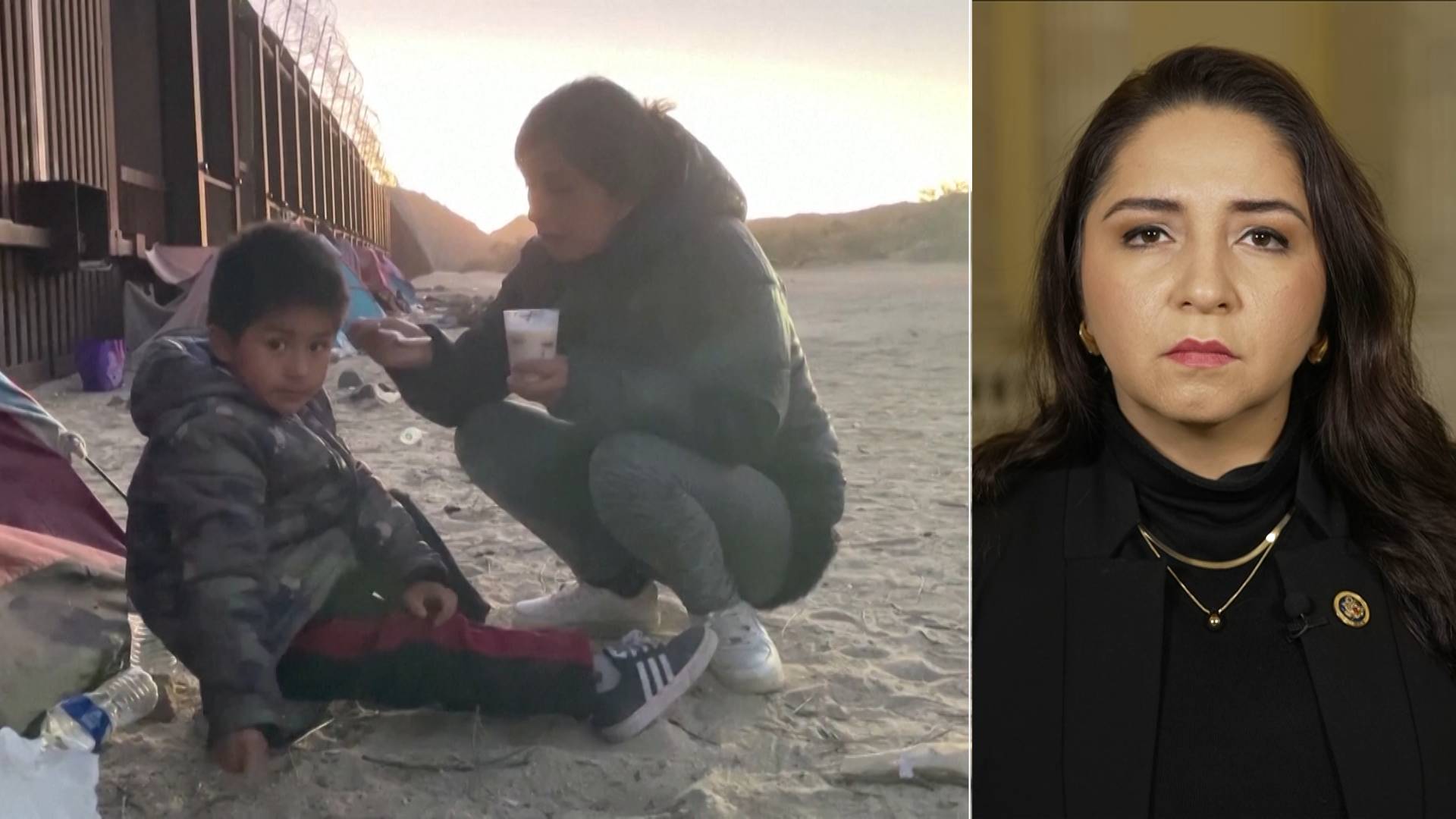This is a rush transcript. Copy may not be in its final form.
AMY GOODMAN: We begin today’s show with the latest developments in Republican President-elect Donald Trump’s promise to carry out the largest deportation campaign in American history when he takes office next month. Democrats on the Senate Judiciary Committee held a hearing Tuesday on the human and economic toll of Trump’s plan, which threatens some 13 million undocumented immigrants. Aaron Reichlin-Melnick with the American Immigration Council was one of the expert witnesses.
AARON REICHLIN–MELNICK: Most undocumented immigrants have spent decades living, working and putting down roots, all at constant risk of deportation. Nearly all are either employed or attending school. Some have permission to work legally. Most do not, putting them at increased risk of exploitation. They are farmworkers, meat packers, cooks, waiters, construction workers, factory workers, delivery people, home health aides, nurses, teachers, artists, writers, musicians, entrepreneurs and, yes, even lawyers.
Undocumented immigrants are also more than their jobs. They are parents, spouses, partners, brothers and sisters, grandparents and grandchildren, loved ones and friends to millions of U.S. citizens and permanent residents. Five million U.S. citizen children have at least one undocumented parent. In an average public school classroom of 25 children, at least two have an undocumented immigrant parent at risk of deportation.
AMY GOODMAN: Democrats, who control the Senate for just a few more weeks, called the hearing, but the Senate Judiciary Committee’s top Republican, Senator Lindsey Graham, used Tuesday’s hearing to support Trump’s mass deportation plans.
SEN. LINDSEY GRAHAM: So, if you’re here illegally, get ready to leave. If you’re a criminal, we’re coming after you first.
AMY GOODMAN: This comes as Trump’s pick for border czar, Tom Homan, vowed Monday to start mass deportations in Chicago and said he would prosecute the city’s Democratic mayor if he impedes them. Homan is meeting Thursday with New York City Mayor Eric Adams on how to, quote, “operationalize” Trump’s mass deportation plans.
This comes as Trump has also vowed to end birthright citizenship, while falsely claiming the United States is the only country in the world to have such a policy. He spoke Sunday with Kristen Welker of NBC’s Meet the Press.
KRISTEN WELKER: You’ve promised to end birthright citizenship —
PRESIDENT–ELECT DONALD TRUMP: Yeah.
KRISTEN WELKER: — on day one.
PRESIDENT–ELECT DONALD TRUMP: Correct.
KRISTEN WELKER: Is that still your plan?
PRESIDENT–ELECT DONALD TRUMP: Yeah, absolutely.
KRISTEN WELKER: The 14th Amendment, though, says that, quote, “All persons born in the United States are citizens.” Can you get —
PRESIDENT–ELECT DONALD TRUMP: Yeah.
KRISTEN WELKER: — around the 14th Amendment with an executive action?
PRESIDENT–ELECT DONALD TRUMP: Well, we’re going to have to get it changed. We’ll maybe have to go back to the people. But we have to end it. We’re the only country that has it.
AMY GOODMAN: For more, we’re joined from the Cannon Rotunda of the House of Representatives in Washington, D.C., by Congressmember Delia Ramirez, Democrat from Illinois. Her district includes Chicago. She’s the daughter of Guatemalan immigrants, born in the United States like thousands of other U.S. citizen children whose parents are immigrants. Many of her constituents are the children of immigrants.
Congressmember Ramirez, welcome back to Democracy Now! If you can start off by talking about this promise that the mass deportations will begin in Chicago? And what will happen to the Chicago mayor?
REP. DELIA RAMIREZ: Yeah. I mean, Tom Homan decided to come not just to Chicago to make those promises, but he came to my very own district, the district of Guatemalan immigrant — daughter of Guatemalan immigrant and congresswoman. And I’ve got to tell you, the level of disrespect is clear.
But I will say to you that a number of us have said it very loud and clear. You can come to the 3rd District. You can come to any part of the city and the state of Illinois. In Illinois, we understand the impact and the contributions of immigrants, and we will do everything in our power to protect the families that have created the fabric of our country.
I mean, look, I know that he’s going to try to target the mayor, the governor, myself and others. But we also recognize that when he’s talking about deporting, he’s talking about deporting people who have been here decades — decades — and raised children, put them through college. And it’s absolutely unacceptable that he begin thinking about and targeting cities like Chicago, where we understand that we have thrived in the way that we have because of its immigrants.
AMY GOODMAN: And what about Homan, who Trump has dubbed the “border czar,” saying that he would prosecute the city’s Democratic mayor if he impedes them? How exactly, do you understand at this point, people are going to be rounded up?
REP. DELIA RAMIREZ: Yeah. I mean, look, it’s really difficult, because they keep saying they’re going to do this, they’re going to do that. He’s talking about, on day one, he’s going to end birthrights for U.S. citizens. And we know that it’s constitutional, he can’t do that.
The reality is, what I think he’s going to probably attempt to do is attempt to take and deport people who are already in detention centers. I mean, look, if we’re talking about people who have a criminal record and have a felony, they’re already in order of deportation proceedings to be deported out of the country. I have a feeling that what they’re going to end up doing is going into detention centers and begin the deportation. But, of course, no one — no one — is safe under Donald Trump. And so, I could imagine that they’d attempt to go to courthouses or where people have appointments, people who are abiding by law every single day, whose only crime, according to Donald Trump, is to have entered this country unauthorized or have overstayed a visa because of our broken immigration system.
In the state of Illinois, we passed legislation years ago, actually, in his first presidency, stating that in the state of Illinois, through the TRUST Act, we would not have ICE working closely with local police to deport families and individuals whose only crime is to be undocumented in this country. I suspect that we will continue to do that work under Governor Pritzker and under Mayor Johnson to ensure that families and individuals are protected, in a time where we know that we’re trying to understand the jurisdictions of what he can and can’t do. Clearly, Donald Trump doesn’t know what he can and can’t do. And so, really making sure that people like me, a daughter of immigrants, is protecting them and is working with organizations and legal organizations to do so will be incredibly important in this moment.
AMY GOODMAN: Congressmember Ramirez, can you talk about your own family? And are you afraid?
REP. DELIA RAMIREZ: Well, look, Amy, up until two months ago, my husband was a DACA recipient, in this country since the age of 14, someone who has a bachelor’s degree in psychology with a real focus on early child development, someone who has dedicated his life to this country and, I would argue, is as American as any other American and U.S. citizen. He got the email, that so many people have been anxiously waiting from USCIS, saying you are finally a green card holder. That has made me feel a little better.
But that’s not the reality for my uncle and so many people in this country — right? — that are so worried that in their every single day life, as they’re working in a diner or as they’re working in construction or as they’re taking their children to school, that at any moment they could be stopped by ICE and deported from the country that they have given so much to and ripped apart from their children.
And the idea that you have Tom Homan or Donald Trump talking about, “Well, if the U.S. citizen children are worried about being separated, then why don’t they get deported themselves, too?” well, first of all, you can’t deport U.S. citizens. But the reality that he would actually say that a 3-year-old, a 4-year-old, a 2-year-old, a baby should be ripped from the hands, from the arms of their mother is, to me, the most un-American and certainly the most evil.
AMY GOODMAN: Birthright citizenship is in the Constitution. How would President Trump get around that?
REP. DELIA RAMIREZ: Well, look, first of all, this whole day one thing he likes to say so that he can get all the hits he can is ridiculous. It is a constitutional right for anyone born in this country to have U.S. citizenship. And as you heard previously, it is the 14th Amendment. You can’t get around the 14th Amendment. He would have to go to the Supreme Court, which, in this case, unfortunately, he has already stacked with his very conservative, only-do-whatever-Donald-Trump-says Supreme Court justices. But that means he can’t do it on day one. And if he wanted to do it through congressional action because in the House he has one-vote majority, first of all, it would be very difficult even if it was just by one vote. But, Amy, it would require a constitutional amendment, that requires two-thirds votes for that constitutional amendment, and there is no world that this Congress would give him those numbers. So, look, it won’t happen on day one.
But the idea that he would say this is so un-American, unconstitutional and undemocratic. Think about it. Millions of us, we are doctors, service members, members of Congress. And you’re saying you’re going to take their citizenship away from them? We should be asking ourselves as the American people: First, U.S. citizens who are first generation, then who is next? Who is American enough for Donald Trump?
AMY GOODMAN: So, let’s talk about who’s next. During a recent interview on 60 Minutes, Trump’s pick to be border czar, Tom Homan, said that mass deportation campaign could also target U.S.-born children born to undocumented parents. He was being interviewed by Cecilia Vega.
CECILIA VEGA: We have seen one estimate that says it would cost $88 billion to deport a million people a year.
THOMAS HOMAN: I don’t know if that’s accurate or not.
CECILIA VEGA: Is that what American taxpayers should expect?
THOMAS HOMAN: What price do you put on national security? Is it worth it?
CECILIA VEGA: Is there a way to carry out mass deportation without separating families?
THOMAS HOMAN: Of course there is. Families can be deported together.
AMY GOODMAN: So, there is Homan saying of course there’s a way not to separate families that are of — that are both legally in the United States and not: Just deport them all.
REP. DELIA RAMIREZ: Amy, it’s so interesting — right? — and hypocritical. Tom Homan’s ancestors are not originally from this area, from this region, from the United States. When his ancestors came — and I’m sure the Statue of Liberty was welcoming them — they didn’t have to go through a bunch of paperwork to enter this country. Some would argue that in that time borders were very different. Some would even define it as even more open borders. Give me your tired, give me your hungry, and we will take them in, and we’ll make this country the beautiful country it is.
It is cynical to me for this man to be the same man that says he represents a future president that cares about families and saying, “Simple. Have them get deported with their parents.” They have nothing else, these children, than the United States as their country. They are as American as Tom is, as American as Tom’s parents are, as American as Tom’s family is. And yet here he is: “Simple. Just go ahead and have them deported.”
This is a moment for Democrats and for people who remember how this country’s economic opportunities were built, those that perhaps their parents came in the early 1900s, Italian Americans to New York, or those that came 25, 30 years ago or now, to ask themselves, “What kind of country are we? Are we going to say that children whose country is the United States, we’re going to send them to go die in a country that they don’t know?” This is a moment for us to be fearless and courageous, to take a stand for every single person that Donald Trump is attacking, if it’s trans kids, if it’s women, if it’s immigrants, because he’s coming for every one of us that he believes and he deems not American enough.
AMY GOODMAN: What can President Biden do in these last weeks of his administration that would protect undocumented immigrants?
REP. DELIA RAMIREZ: Yeah. Well, look, I think there’s a number of things and a number of executive orders, that you perhaps have heard from a number of advocacy groups, that have been sent to him. There’s renewals of DACA that could be done. People who have DACA and maybe their appointment is in February or March, why not just make sure that they’re renewed, if all the paperwork is correct. There is no criminal record, by the way. If you are a DACA recipient, you have to have a clean record, no criminal background. Already we vet all those things. Give those automatic renewals. Extend protections for people who are already on parole. Extend the TPS for those that are about to have their TPS expire. There’s a number of things we could be doing. We still have the White House. And if I’m President Biden, I am working every breathing moment between now and the change of power to protect as many Americans as I possibly could.
AMY GOODMAN: Well, you’re not President Biden, so do you know what he is actually doing?
REP. DELIA RAMIREZ: I am not President Biden. I am very clear and aware of that. Look, I understand that they are looking at a number of things. I don’t have clear direction on what those are and what has been, in fact, approved. But I’ll guarantee you, Amy, I’m calling his office, and I’m calling the secretary of homeland, on a regular, every single day. There is no holiday party here that I’m interested in. I am interested in making sure that we’re extending the protections to as many people as we can as we still have the White House and the Senate.
AMY GOODMAN: Congressmember Delia Ramirez, Democratic congressmember from Illinois, the daughter of Guatemalan immigrants, thanks so much for joining us from the Capitol.
REP. DELIA RAMIREZ: Thank you, Amy.
AMY GOODMAN: Coming up, we look at the growing crisis in Haiti after almost 200 people were massacred in Cité Soleil, a neighborhood of Port-au-Prince, the capital. Then we’ll be joined by two family members of two Black men who were killed, one by a white vigilante on the subways of New York, another by two Indianapolis police officers. In the trials of all of these men, they were acquitted. Stay with us.











Post comments (0)